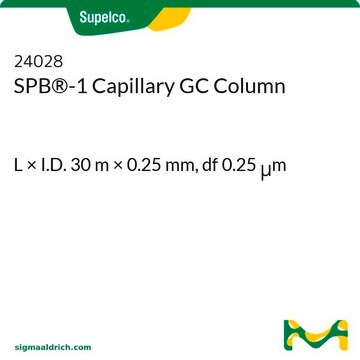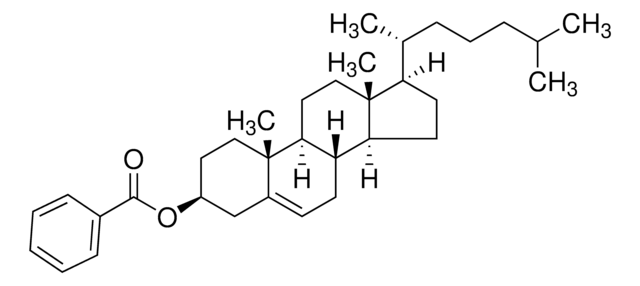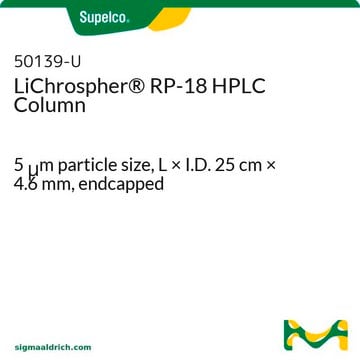23304-U
SPB-1®
L × I.D. 60 m × 0.25 mm, df 3.00 μm
Se connecterpour consulter vos tarifs contractuels et ceux de votre entreprise/organisme
About This Item
Code UNSPSC :
12000000
eCl@ss :
32119290
Nomenclature NACRES :
SB.54
Produits recommandés
Matériaux
fused silica
Niveau de qualité
Agence
meets requirements for USP G1, G2, and G9
Paramètres
-60-300 °C temperature (isothermal or programmed)
Valeur bêta
21
df
3.00 μm
Technique(s)
gas chromatography (GC): suitable
L × D.I.
60 m × 0.25 mm
Groupe de la matrice active
Bonded; poly(dimethyl siloxane) phase
Type de colonne
capillary non-polar
Vous recherchez des produits similaires ? Visite Guide de comparaison des produits
Description générale
Application: This column is often used for traditional general purpose applications, where a non-polar column is required. Analytes will be separated primarily according to boiling point.
USP Code: This column meets USP G1, G2, and G9 requirements.
Phase:
USP Code: This column meets USP G1, G2, and G9 requirements.
Phase:
- Bonded
- Poly(dimethyl siloxane)
- ≤0.32 mm I.D., <2 μm: -60 °C to 320 °C (isothermal or programmed)
- ≤0.32 mm I.D., ≥2 μm: -60 °C to 300 °C (isothermal or programmed)
- ≥0.53 mm I.D., <2 μm: -60 °C to 300 °C (isothermal) or 320 °C (programmed)
- ≥0.53 mm I.D., ≥2 μm: -60 °C to 260 °C (isothermal) or 280 °C (programmed)
Application
SPB®-1 capillary GC column may be used for herbicide determination using In-tube Solid-phase microextraction (SPME).
Autres remarques
We offer a variety of chromatography accessories including analytical syringes
Informations légales
SPB is a registered trademark of Merck KGaA, Darmstadt, Germany
Faites votre choix parmi les versions les plus récentes :
Déjà en possession de ce produit ?
Retrouvez la documentation relative aux produits que vous avez récemment achetés dans la Bibliothèque de documents.
Sachin P Bachate et al.
Applied microbiology and biotechnology, 93(5), 2135-2145 (2011-10-11)
Two heterotrophic As(III)-oxidizing bacteria, SPB-24 and SPB-31 were isolated from garden soil. Based on 16S rRNA gene sequence analysis, strain SPB-24 was closely related to genus Bordetella, and strain SPB-31 was most closely related to genus Achromobacter. Both strains exhibited
L J Krutz et al.
Journal of chromatography. A, 999(1-2), 103-121 (2003-07-30)
Liquid-liquid extraction or solid-phase extraction followed by gas chromatography (GC) or high-performance liquid chromatography are traditional herbicide residue determination methods for environmental samples. Solid-phase microextraction (SPME) is a solventless, fast, and sensitive alternative herbicide residue extraction method that can be
Chromatograms
suitable for GC, application for air monitoringNotre équipe de scientifiques dispose d'une expérience dans tous les secteurs de la recherche, notamment en sciences de la vie, science des matériaux, synthèse chimique, chromatographie, analyse et dans de nombreux autres domaines..
Contacter notre Service technique








